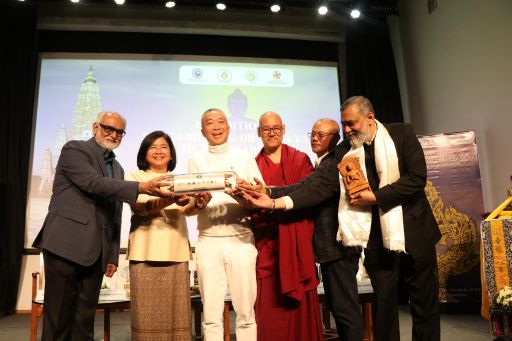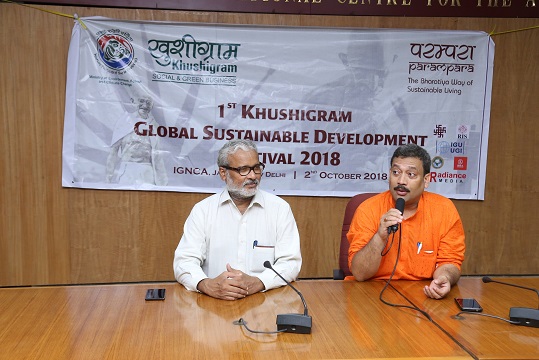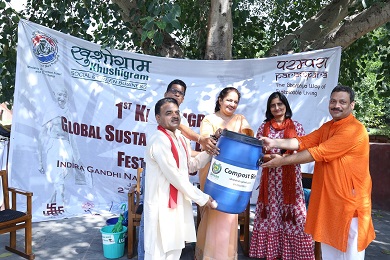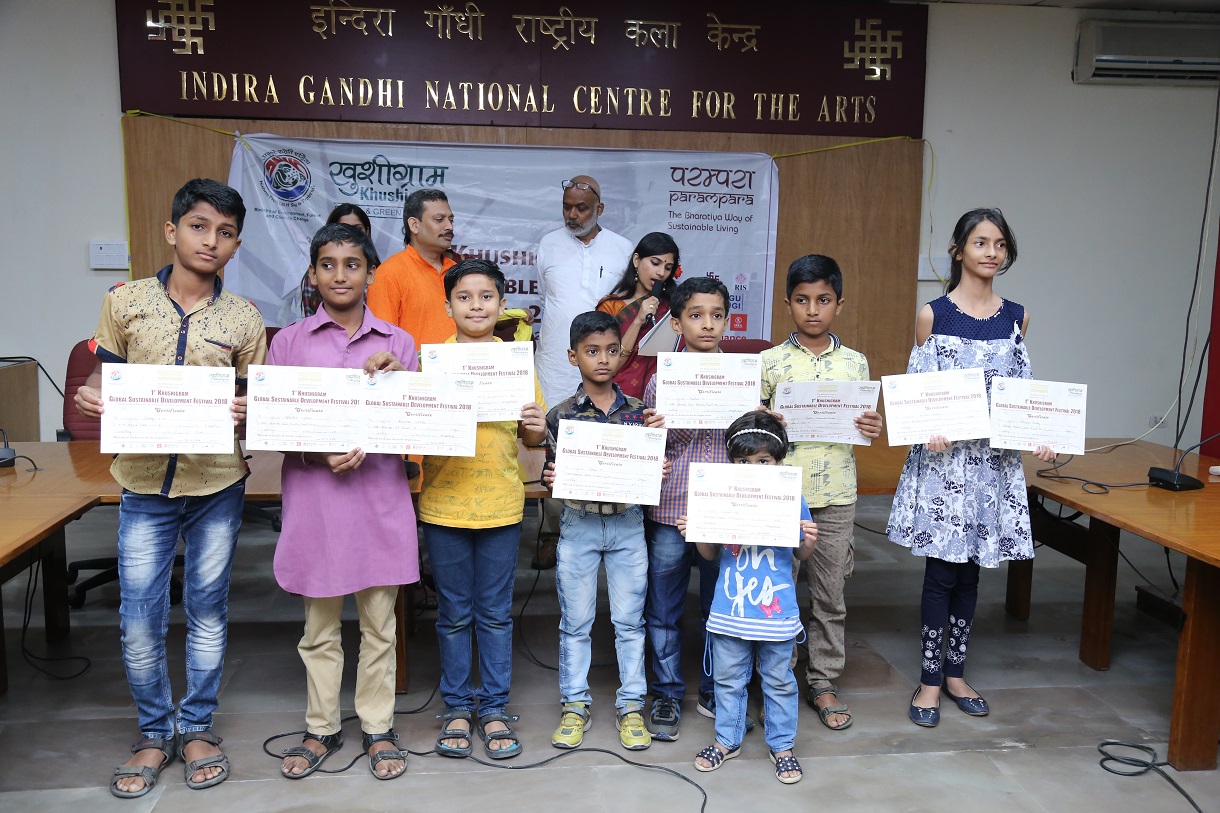4th Mekong Ganga Dhammayatra to strengthen Mekong - Ganga ties
The 4th Mekong Ganga Dhammayatra to the Buddhabhoomi (India) of over 20 Buddhist scholars, former civil servants and other eminent citizens from Thailand arrived in Delhi today as emissaries for strengthening the deep connection between the Mekong and Ganga civilisations that have linked India with South East Asia for centuries.
The Dhamma Yatra, a
pilgrimage, is a partnership between Thailand and India endorsing cooperation
in all dimensions, including the public, private, and public sectors, to
declare the Century of Dharma, is led by Dr. Supachai Viraphuchong,
Secretary-General of the Bodhgaya Institute 980, together with partner
organizations from India and Thailand. The aim of the Yatra is to promote the enduring message of the Dhamma globally
for Conflict Avoidance and Environment Consciousness.
The event is being
organised by BodhiGaya Vijjalaya 980, in collaboration
with partner organizations from India and Thailand, such as Vivekananda
International Foundation, India (VIF), International Centre for Cultural
Studies, India (ICCS), International Buddhist Confederation (IBC), Royal Thai
Embassy in New Delhi, Embassy of India in Thailand, State of Bihar, Thai
Buddhist Temple in Bodhgaya, and Viraphuchong Foundation, Thailand.
Dr Supachai, the
head of the Thai delegation and of BodhiGaya Vijjalaya 980 addressing a Press
Conference here today stated that his dream was to get all the countries along
the Mekong River and the Ganga together as both the Buddhist and Hindu cultures
were same, “We believe in dhamma from India. We cannot be apart from the
Hindus. I have Brahma in my office. Some temples have Shiva; Hindu- Buddhism
cultures are mixed well.” To cross over the border of our five-nations
(Thailand, Vietnam, Cambodia, Laos, and India) in the brotherhood of Buddha is
possible if we work towards it. But with the support of Prime Minister Modi, we
can achieve it, “he emphasised.
With so much grief,
sorrow, and greed in the world all around, only two things everybody is
chasing: Money and Power, he stressed that ultimately we take nothing with us.
We need to link everything to Buddha, have compassion, lead a moral life, and
help as many people as possible, especially the poor; as brothers, this is our
linkage, he said.
Dr Supachai, who
stayed in India at the age of 18 as a Monk, today owns several hotels and many
other businesses, yet his main goal continues to be to work for Dhamma and
wants to work in tandem with the vision of Prime Minister Narendra Modi. Prime
Minister Modi had stated in 2015 that “the 21st century” is the “Asian
Century”, and in this “Asian Century” the role of Buddha Dhamma remains central
in connecting the nations in this region.”
“The Dhamma extends
to the entire mankind. I am confident that PM Modi’s vision will be successful.
King Ashoka was a great warrior and could have captured the East by force. But
he sent his emissaries. Now, 2500 years later, we still believe in dhamma.
Today we have technology which can help spread Dhamma faster and we hope to see
the spread of dhamma values to the world. Prime Minister Modi should use dhamma
to lead the world. Over five million people paid respects at the 3rd Dhamma
Yatra of the Holy Relics in Thailand. I want to spend my last years of
life in the service of Dhamma with no expectations,” he concluded.
The “Declaration on
Dhamma Century”, is based on the vision of the “Asian Century with Dhamma
Principles” as proposed by Prime Minister Narendra Modi, stating in 2015 that
“the 21st century” is the “Asian Century”, and in this “Asian Century” the role
of Buddha Dhamma remains central in connecting the nations in this region.
This Dhamma Yatra
is a continuation of the 3rd Ganga -Mekong Yatra which witnessed the
journey of the Relics of the Buddha and his two disciples Arhant Sariputta and
Arhant Maha Moggallana to Thailand earlier this year.
Later, at a
function to felicitate the delegation, the Secretary General of IBC welcoming
the delegates said that at IBC we strive to do better following the Dhamma. We
are working to serve the entire humanity. These are challenging times; we
Buddhists have great responsibility. We need to execute these responsibilities
on the ground,” he added.
The Director
General of International Buddhist Confederation Abhijit Halder expanding the
relevance of the visit said that this visit dates back to 2000 years, when
Ashoka sent his emissaries. From then on a large number of people travelled to
India to study Buddhism.
The way people
reacted to the relic exposition in Thailand shows the love, devotion, and
respect among the Thai people. The golden bond between the two countries will
live for a long time to come as “Mekong- Ganga” brings together the people of
Asia. Both rivers have given birth to great civilisations and give us the
opportunity to reach out to people from countries of the Mekong basin.
We are looking into
many proposals; one being hosting football tournaments from SE Asia in NE
India.
In his address Dr
Sacchidananda Joshi, Member Secretary, Indira Gandhi National Centre for the
Arts (IGNCA) noted that these civilizations are more than geographical
landmarks. Each civilization brings with it a legacy of wisdom. The
similarities in the Mekong civilizations also indicates a mark of their great
resilience. Can we also think of the Mekong Ganga Museum for shared heritage.
In contemporary times we draw inspiration from shared tradition. The message of
Dhamma is as important today as it was 200 decades ago. Initiatives like the
Mekong Ganga Yatra is an opportunity to rediscover our common roots and
celebrate the linkages that unite us, he said.
Dr Joshi concluded
by saying that the IGNCA was committed to preserving Buddhist knowledge,
heritage and strengthening ties with SE Asian nations.
The Ambassador of
Thailand to India, Ms. Pattarat Hongtong, the Chief Guest in her address noted
that as a Buddhist she expressed deep appreciation for all organisations
involved in the Mekong-Ganges Yatra, these efforts are a testimony of deep ties
between India and Thailand.
“We have various
areas of cooperation but dhamma is essential. Links with Asian countries
extended to India, in this context the 3rd Yatra was a stepping- stone for
deepening bilateral ties. We are committed to promoting Dhamma diplomacy,” she
explained.
Adding that under
the Act East policy we can see the Asian Century through principles of Dhamma.
Together we can make this century of dhamma as envisioned by PM Modi and other
leaders.

















